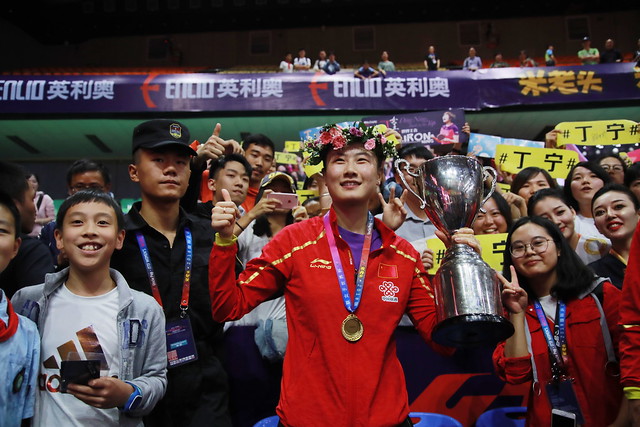by Ian Marshall, Editor
The odds are with Suh Hyowon being the no.6 seed as opposed to Jian Fang Lay who is the no.20 seed but her defensive style and, the fact that when she attacks she is not the most powerful player in the tournament, gives the Australian time to respond. Equally, the fact that the attacking strokes of Jian Fang Lay are not loaded with heaving top spin as opposed to many of the current era; that could well give the Korea Republic player more than food for thought.
Suh Hyowon starts as the favourite; as simply by their record and status, do Zhu Yuling, the top seed and Ding Ning, the no.3 seed, significantly in different halves of the draw.
Zhu Yuling faces Sweden’s Matilda Ekholm, the no.14 seed, for the first time in her career on the international scene; Ding Ning opposes Austria’s Liu Jia, the no.16 seed. They have met on two prior occasions, at the Zen-Noh 2014 World Team Championships and at the 2007 ITTF World Tour Swedish Open; on both occasions the verdict, with just the loss of one game, went in favour of Ding Ning.
Consistency able to keep the ball on the table with their counter attacking skills appears to rise to a new level every time you watch Ding Ning and Zhu Yuling. Now could consistent skills of a different nature combined with endless patience, cause the downfall of the one other player on duty in Chengdu who has won the Women’s World Cup title? Japan’s Miu Hirano, the no.5 seed and the winner two years ago in Philadelphia confronts the solid defensive skills of DPR Korea’s Kim Song I is the no.18 seed. It is the first time she has met Miu Hirano in a world ranking event. Could that be to her advantage?
Miu Hirano does not necessarily start as the favourite but that is not the case for colleague Kasumi Ishikawa, the no.2 seed; having won 10 of their 13 meetings on the international stage, including earlier this year at the Asian Cup in Yokohama, the odds are on her side against Chinese Taipei’s Chen Szu-Yu, the no.13 seed.
An inspired performance is needed from Chen Szu-Yu if there is to be an upset; conversely, if for her colleague, Cheng I-Ching, the no.4 seed, if there is to be a win as status advises, a repeat performance is required. Last year in Markham she beat Hungary’s Georgina Pota in the opening round, the meet again in the first round in Chengdu. Georgina Pota is the no.15 seed.
The task for Georgina Pota, to some extent is to resign the defeat experienced at the hands of Jian Fang Lay in her concluding group phase match on the opening day to history and start again; for Romania’s Elizabeta Samara, the no.10 seed, the situation is quite the reverse. Having remained unbeaten in the group phase contests, saving two match points against each of Egypt’s Dina Meshref and Chen Szu-Yu, she must have an added sense of belief.
In the opening round she faces Austria’s Sofia Polcanova, the player against whom she has experienced defeat on the only two occasions when they have met in a world ranking tournament. She lost in Women’s Team event at the Liebherr 2015 European Championships in Ekaterinburg before later progressing to win the Women’s Singles title. More recently she suffered at the Europe Top 16 tournament in Gondomar.
Whatever the evidence, two very evenly matched players enter the arena; however, if there is a contest that is on the knife-edge, it is that involving Elizabeta Samara’s colleague, Bernadette Szocs, the no.12 seed.
She faces Hong Kong’s Doo Hoi Kem, the no.7 seed. Overall on the international scene, they have met 10 times, it is parity; moreover it is parity this year. Doo Hoi Kem won when they met at the Liebherr 2018 World Team Championships in Halmstad, Bernadette Szocs prevailed later at the Seamaster 2018 ITTF World Tour Japan Open in Kitayushu. It’s too close to call.
Following the first round matches, later in the day at 4.00pm (local time) the quarter-finals will commence.
Uncle Pop 2018 ITTF Women’s World Cup: Statistic provided by Beijing Sport University






